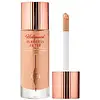What's inside
What's inside
 Key Ingredients
Key Ingredients

 Benefits
Benefits

 Concerns
Concerns

 Ingredients Side-by-side
Ingredients Side-by-side

Zinc Oxide 12%
Cosmetic ColorantWater
Skin ConditioningC12-15 Alkyl Benzoate
AntimicrobialTitanium Dioxide
Cosmetic ColorantCI 77891
Cosmetic ColorantButyloctyl Salicylate
Skin ConditioningLauryl PEG-8 Dimethicone
Isododecane
EmollientPropanediol
SolventDimethicone
EmollientNiacinamide
SmoothingPolymethylsilsesquioxane
Isohexadecane
EmollientTrilaureth-4 Phosphate
EmulsifyingDimethiconol
EmollientCaprylyl Methicone
Skin ConditioningMica
Cosmetic ColorantOctyldodecyl Neopentanoate
EmollientLauryl PEG-10 Tris(Trimethylsiloxy)Silylethyl Dimethicone
EmulsifyingSodium Chloride
MaskingPhenoxyethanol
PreservativeBisabolol
MaskingIron Oxides
CI 77492
Cosmetic ColorantDisteardimonium Hectorite
StabilisingCaprylyl Glycol
EmollientAllantoin
Skin ConditioningCI 77491
Cosmetic ColorantAluminum Hydroxide
EmollientPolyglyceryl-4 Diisostearate/Polyhydroxystearate/Sebacate
EmulsifyingEthylhexylglycerin
Skin ConditioningHexylene Glycol
EmulsifyingPropylene Carbonate
SolventHydrogenated Lecithin
EmulsifyingCI 77499
Cosmetic ColorantPEG-10
HumectantTetrasodium Glutamate Diacetate
Sodium Hydroxide
BufferingZinc Oxide 12%, Water, C12-15 Alkyl Benzoate, Titanium Dioxide, CI 77891, Butyloctyl Salicylate, Lauryl PEG-8 Dimethicone, Isododecane, Propanediol, Dimethicone, Niacinamide, Polymethylsilsesquioxane, Isohexadecane, Trilaureth-4 Phosphate, Dimethiconol, Caprylyl Methicone, Mica, Octyldodecyl Neopentanoate, Lauryl PEG-10 Tris(Trimethylsiloxy)Silylethyl Dimethicone, Sodium Chloride, Phenoxyethanol, Bisabolol, Iron Oxides, CI 77492, Disteardimonium Hectorite, Caprylyl Glycol, Allantoin, CI 77491, Aluminum Hydroxide, Polyglyceryl-4 Diisostearate/Polyhydroxystearate/Sebacate, Ethylhexylglycerin, Hexylene Glycol, Propylene Carbonate, Hydrogenated Lecithin, CI 77499, PEG-10, Tetrasodium Glutamate Diacetate, Sodium Hydroxide
Water
Skin ConditioningHydrogenated Didecene
Skin ConditioningMica
Cosmetic ColorantGlycerin
HumectantPropanediol
SolventSqualane
EmollientCetyl PEG/PPG-10/1 Dimethicone
EmulsifyingIsoamyl Laurate
EmollientHydrogenated Styrene/Isoprene Copolymer
Sodium Chloride
MaskingCaprylic/Capric Triglyceride
MaskingHydroxyacetophenone
AntioxidantPolyglyceryl-4 Isostearate
Emulsifying1,2-Hexanediol
Skin ConditioningCaprylyl Glycol
EmollientTrisodium Ethylenediamine Disuccinate
Hoya Lacunosa Flower Extract
Skin ConditioningPentaerythrityl Tetra-Di-T-Butyl Hydroxyhydrocinnamate
AntioxidantCI 77891
Cosmetic ColorantIron Oxides
CI 77163
Cosmetic ColorantWater, Hydrogenated Didecene, Mica, Glycerin, Propanediol, Squalane, Cetyl PEG/PPG-10/1 Dimethicone, Isoamyl Laurate, Hydrogenated Styrene/Isoprene Copolymer, Sodium Chloride, Caprylic/Capric Triglyceride, Hydroxyacetophenone, Polyglyceryl-4 Isostearate, 1,2-Hexanediol, Caprylyl Glycol, Trisodium Ethylenediamine Disuccinate, Hoya Lacunosa Flower Extract, Pentaerythrityl Tetra-Di-T-Butyl Hydroxyhydrocinnamate, CI 77891, Iron Oxides, CI 77163
 Reviews
Reviews

Ingredients Explained
These ingredients are found in both products.
Ingredients higher up in an ingredient list are typically present in a larger amount.
Caprylyl Glycol is a humectant and emollient, meaning it attracts and preserves moisture.
It is a common ingredient in many products, especially those designed to hydrate skin. The primary benefits are retaining moisture, skin softening, and promoting a healthy skin barrier.
Though Caprylyl Glycol is an alcohol derived from fatty acids, it is not the kind that can dry out skin.
This ingredient is also used as a preservative to extend the life of products. It has slight antimicrobial properties.
Learn more about Caprylyl GlycolCi 77891 is a white pigment from Titanium dioxide. It is naturally found in minerals such as rutile and ilmenite.
It's main function is to add a white color to cosmetics. It can also be mixed with other colors to create different shades.
Ci 77891 is commonly found in sunscreens due to its ability to block UV rays.
Learn more about CI 77891Mica is a naturally occurring mineral used to add shimmer and color in cosmetics. It can also help improve the texture of a product or give it an opaque, white/silver color.
Serecite is the name for very fine but ragged grains of mica.
This ingredient is often coated with metal oxides like titanium dioxide. Trace amounts of heavy metals may be found in mica, but these metals are not harmful in our personal products.
Mica has been used since prehistoric times throughout the world. Ancient Egyptian, Indian, Greek, Roman, Aztec, and Chinese civilizations have used mica.
Learn more about MicaPropanediol is an all-star ingredient. It softens, hydrates, and smooths the skin.
It’s often used to:
Propanediol is not likely to cause sensitivity and considered safe to use. It is derived from corn or petroleum with a clear color and no scent.
Learn more about PropanediolChances are, you eat sodium chloride every day. Sodium Chloride is also known as table salt.
This ingredient has many purposes in skincare: thickener, emulsifier, and exfoliator.
You'll most likely find this ingredient in cleansers where it is used to create a gel-like texture. As an emulsifier, it also prevents ingredients from separating.
There is much debate on whether this ingredient is comedogenic. The short answer - comedogenic ratings don't tell the whole story. Learn more about comegodenic ratings here.
The concensus about this ingredient causing acne seems to be divided. Research is needed to understand if this ingredient does cause acne.
Scrubs may use salt as the primary exfoliating ingredient.
Learn more about Sodium ChlorideWater. It's the most common cosmetic ingredient of all. You'll usually see it at the top of ingredient lists, meaning that it makes up the largest part of the product.
So why is it so popular? Water most often acts as a solvent - this means that it helps dissolve other ingredients into the formulation.
You'll also recognize water as that liquid we all need to stay alive. If you see this, drink a glass of water. Stay hydrated!
Learn more about WaterThis ingredient is a combination of red, black, and yellow iron oxide pigments. This combination of colors is usually found in foundation, because it results in a "skin" color.